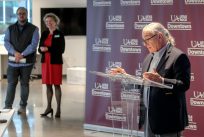 Cybersecurity attacks are a huge liability for the University as well as for any other entity, realistically, in the modern age. However, universities are the development centers of innovation for society. Thus, universities are targets to thieves seeking to steal intellectual property. In addition, thieves can use personal data to hold the University for ransom. These attacks happen within Little Rock weekly, according to the Federal Bureau of Investigations. As these attacks are on the rise, it is vital that universities, cities, states, etc., wake up and protect themselves in order to prevent these devastating attacks. To assist in this effort, UA Little Rock has been awarded a $1 million grant. The grant will support cybersecurity research and training to further develop skilled workers for the growing cybersecurity workforce. According to Lee Watson of the Forge Institute, cybercrime is a growing threat that is expected to cost the world more than $10.5 trillion annually by 2025. This increase in cyberattacks is expected to open 3.4 cybersecurity positions in the next few years; there are already 1,400 open positions in Arkansas.
Cybersecurity attacks are a huge liability for the University as well as for any other entity, realistically, in the modern age. However, universities are the development centers of innovation for society. Thus, universities are targets to thieves seeking to steal intellectual property. In addition, thieves can use personal data to hold the University for ransom. These attacks happen within Little Rock weekly, according to the Federal Bureau of Investigations. As these attacks are on the rise, it is vital that universities, cities, states, etc., wake up and protect themselves in order to prevent these devastating attacks. To assist in this effort, UA Little Rock has been awarded a $1 million grant. The grant will support cybersecurity research and training to further develop skilled workers for the growing cybersecurity workforce. According to Lee Watson of the Forge Institute, cybercrime is a growing threat that is expected to cost the world more than $10.5 trillion annually by 2025. This increase in cyberattacks is expected to open 3.4 cybersecurity positions in the next few years; there are already 1,400 open positions in Arkansas.
The Consortium for Cybersecurity Innovation (CCI) consists of three partners – UA Little Rock, The Forge Institute, and UA Pine Bluff. The CCI was founded to assist in developing cybersecurity professionals for the rapidly growing cybersecurity workforce. The CCI was awarded a $1 million grant to assist in preventing energy focused cyber attacks. Energy focused attacks, as the name implies, have the goal to disrupt the energy sector if the attacker’s demands are not met. For instance, an attacker may access a portion of the power grid and force a black out in demand of a ransom. With this grant, the CCI will work to prevent these attacks. Dr. Philip Huff has been a stalwart of cybersecurity innovation within the Department of Computer Science at UA Little Rock, helping to found the CCI. Dr. Huff worked in the Arkansas entergy sector for 15 years before coming to UA Little Rock, so he is well aware of these attacks as well as the usual outcome. He is working to thwart them with innovations such as the UA Little Rock Trojan Cyber Arena, which provides a remote, cloud-based user environment for cybersecurity students in the state to thwart simulated attacks.
One way to prevent personal cyber attacks is to use multi factor authentication (MFA) such as two factor authentication – where the computer program relays a code to your phone via text, email, or an application. Currently, this is the best defense. In the future, this may change as “bot” programs become more advanced and complex. Another method to prevent these attacks is to frequently change your password. Dr. Philip Huff recommends using a password generator. These programs generate a random passkey for each session. Also, Dr. Huff is a huge advocate of having a backup on a cloud server. These cloud servers are less prone to attacks due to their rigorous security measures. As with anything, however, the threat still exists.
Read the full University press release for more details on this exciting grant: https://ualr.edu/news/2023/05/30/cybersecurity-consortium/
And read more about the Consortium for Cybersecurity Innovation here: https://ualr.edu/news/2021/12/03/consortium-for-cyber-innovation/
